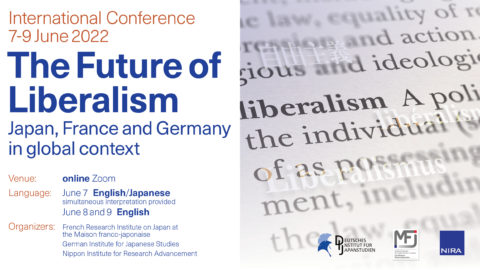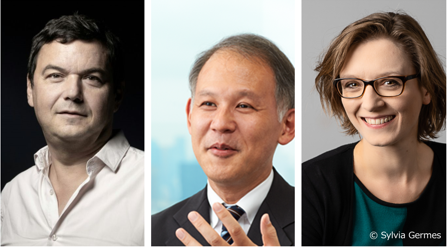
Download
Co-organizer

organised by the French Institute of Research on Japan at the Maison franco-japonaise, The Nippon Institute for Research Advancement, and the German Institute for Japanese Studies
Registration Info
This is a past event. Registration is no longer possible.
Please subscribe below to stay informed about our research activities, events & publications:
The Future of Liberalism
Japan, France and Germany in global context
June 7 - June 9, 2022
Videos of this event are now available on the DIJ’s YouTube channel here
Report on Days 2 und 3 (PDF)
The evolution of human societies can be seen to be supported by the rise of dominant narratives – religions or political ideologies, which in turn reflect the technological regimes of the times. Technology changes not only our means of production; it influences how we interact with our environment, how we perceive ourselves and our place in the world and what we consider as “good” or “bad”. The present revolutions in information technology and bioscience seem to contradict the basic assumptions of liberalism. Platform monopolies, fake news, and surveillance capitalism equally undermine liberal institutions.
The present pandemic has also dramatically questioned the liberal foundations of public policies and governance in democratic regimes. The restrictive policy measures adopted in the fight against Covid-19 have produced “illiberal” outcomes similar to the stances taken by populist political parties. High-level constraints impact individual liberties, responsibility, social cohesion and/or social control, but also free trade, competitiveness, and market regulation. How far are citizens prepared to accept trade-offs between civil liberties and public guarantees regarding health, environment, and safety? How are these constraints dealt with in so-called “liberal” or neoliberal” democratic countries?
The above issue is of central and essential concern for Japan and Europe and their relationships with neighbours and major partners. Taking into consideration growing pressure from a more competitive environment, Japan and Europe need to redefine their understanding of core values with regard to economic, social, and individual rights to redirect their relationships not only at an intellectual and discursive level, e.g. science and “soft-power”, but also in practical terms such as national and international policies.
Rather than falling into the trap of cultural and civilizational determinism, this symposium aims to stress sociopolitical, philosophical, and economic logics at work in the process of changes in production and exchange caused by the transformation of technological regimes and the ongoing global crisis. In doing so, we also intend to shed renewed light on the reception and the evolution of the liberal ideology in Asia and Europe, especially in Japan, France, and Germany.
Program (for details please see PDF)
June 7
4.30 pm – 7.45 pm (JST) / 9.30 am – 12.45 pm (CET)
Moderators: Gilles Campagnolo (IFRJ-MFJ), Adrienne Sala (IFRJ-MFJ)
4:30-4:45 Opening remarks
Philippe Setton, Ambassador of the French Republic to Japan
Clemens von Goetze, Ambassador of the Federal Republic of Germany to Japan
4:45-4:50 Introduction by Bernard Thomann, Director of the French Institute of Research on Japan at the Maison franco-japonaise
4:50-5:00 Presentation of the symposium by its initiators – Gilles Campagnolo and Adrienne Sala (IFRJ-MFJ)
5:00-5:45 Keynote speech: A Brief History of Equality, Thomas Piketty (EHESS)

5:45-6:30 Round table with Thomas Piketty (EHESS), Lisa Herzog (University of Groningen), and Shigeki Uno (University of Tokyo)
6:30-7:40 General discussion
7:40-7:45 Concluding remarks by Franz Waldenberger, Director of the German Institute for Japanese Studies
June 8
3 pm – 8.30 pm (JST) / 8 am – 1.30 pm (CET)
Discussant: Bernard Sinclair-Desgagné (Skema Business School, GREDEG)
Moderators: Gilles Campagnolo (IFRJ-MFJ), Adrienne Sala (IFRJ-MFJ)
3:00-4:30 Liberalism(s)/Neoliberalism(s): concepts, theories, debates (I):
Liberalism and Uncertainty Facing Future Developments
- Miriam Teschl (EHESS)
- Richard Sturn (University of Graz)
- Naoki Yoshihara (University of Massachusetts Amherst)
4:30-4:45 Break
4:45-6:15 Liberalism(s)/Neoliberalism(s): concepts, theories, debates (II):
Liberalism and Neo-liberalism Basic sustainable Values
- Serge Audier (Sorbonne Paris 4)
- Tsutomu Hashimoto (Hokkaido University)
- Yufei Zhou (Teikyo University)
6:15-6:30 Break
6:30-7:45 Liberalism(s)/Neoliberalism(s): concepts, theories, debates (III):
Liberalism and Capitalism in Historical and Philosophical Perspective
- Valérie Charolles (Institut Mines-Télécom Business School, EHESS/CNRS)
- Nikita Dhawan (TU Dresden)
- Shinji Nohara (University of Tokyo)
7:45-8:30 General discussion
June 9
4 pm – 8 pm (JST)/ 9 am – 1 pm (CET)
Moderators: Sébastien Lechevalier (IFRJ-MFJ), Franz Waldenberger (German Institute for Japanese Studies)
4:00-5:30 Technology and capitalism
- Franz Waldenberger (German Institute for Japanese Studies)
- Cedric Durand (Univ. de Genève)
- Saori Shibata (Sheffield University)
5:30-5:45 Break
5:45-7:15 Technology, Digitalization and Ethics of Responsibility
- Yuko Harayama (Tohoku University)
- Joanna J Bryson (Hertie School)
- Mario Ionuț Maroșan (Univ. Laval)
7:15-8:00 General discussion and concluding remarks